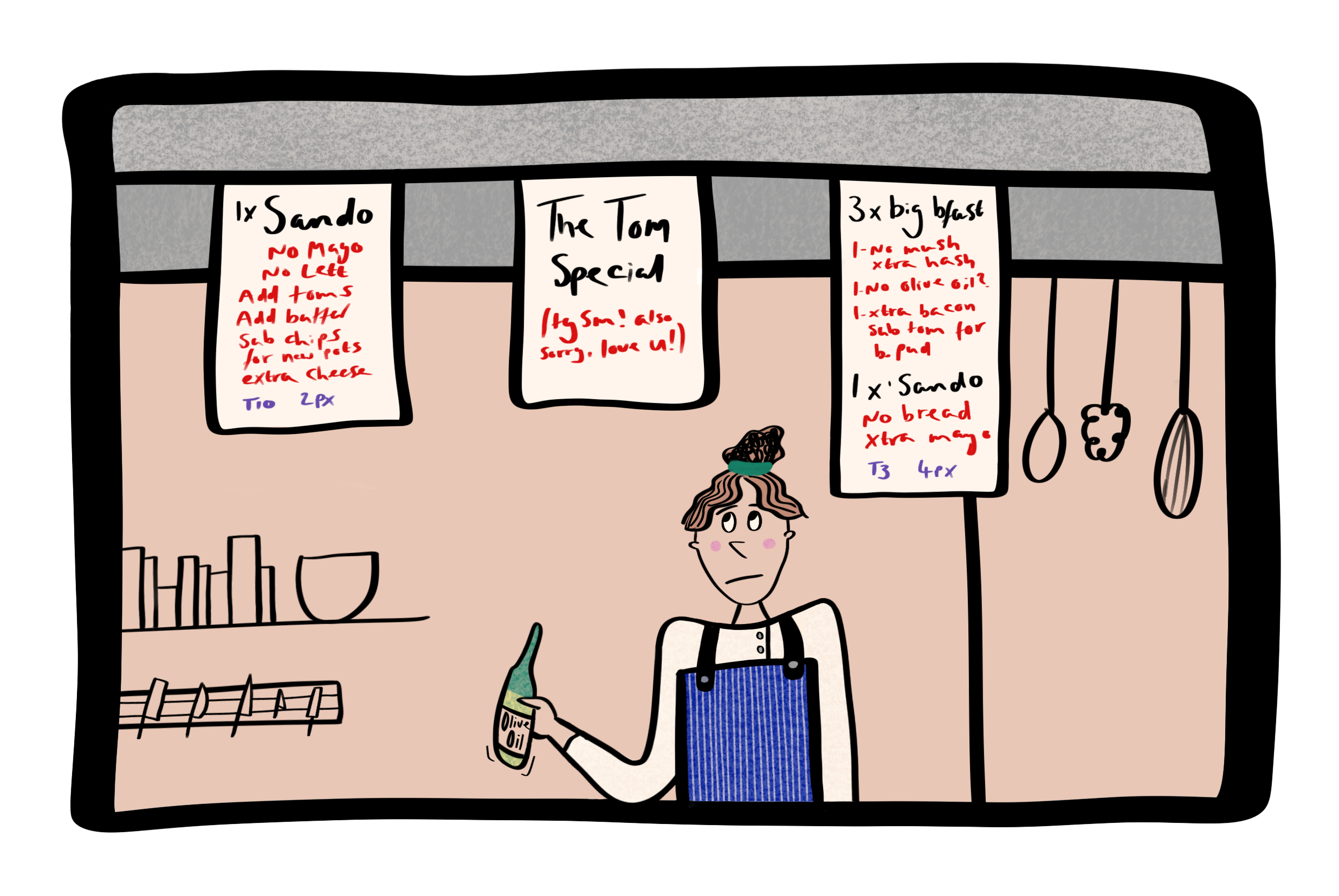Modifications
Have you ever caught a glimpse of someone on their phone with all dominant digits going at full frenzy? As you watch a lengthy block of text grow, you imagine being the recipient of that message and you gulp.
This is how a cook feels when a ticket comes into the kitchen with modifications. It’s fairly common, whether it be a guest with food allergies or a staff meal requested with a little extra pizazz, but it disrupts flow. Time is needed to accept. “Yeah, we can make that”. Sauce On Side? “Fine, you cowards.”
In kitchens and bars with thermal printers, modifications (or “mods”) are usually stamped in a different ink colour, often delineated with an asterisk, sometimes including a panicked plea from the server. Some are easy to comprehend, others are harder to decipher. Most arrive in red, an alert, a warning, a scarlet letter of sin. Perpetuating the Sisyphean agony of line cooks and bartenders.
Modifications show that someone is familiar enough with the menu, or with dining out, that they can hack the system. For a guest to have frequented establishments long enough to know what they prefer, and the add ons required to customise meals to one's own taste, flaunts a bit of confidence most diners envy. Take, for example, the self-assured order of James Bond’s martini or the way Sally orders pie in ‘When Harry Met Sally”, so nonchalantly. Coincidentally, there are also deliberate hidden menu items such as a “secret burger” at fine dining establishments and even ways to modify fast food items. Nonetheless, there’s a thin line between being in the know and being a nuisance.
Hospitality 101 teaches us that everyone wants to feel special. Regulars, more so. Repeat customers are good for business and it’s vital that they feel accommodated to, wanting to frequent again. Long serving staff members can anticipate guests' preferences. A tailored experience can strengthen bonds, but at whose cost?
“I do think that people forget that places you go to eat don’t just have every ingredient just because ‘it’s a restaurant’”
Food and drink menus are well thought out, account for ingredient and labour pricing, and are deliberately tried-and-true. Things go awry when the ticket printer, which in some ways is like a metronome in a kitchen or bar, begins to improvise – scatting from slight annoyance to heightened vexation depending on how busy a service is. This can lead to inconsistency or not meeting the expectation of the customer entirely. “Last time we were here they didn’t charge us for —”. “When X is working they always top off my glass”, and so on. Adapting to requests is part of the game, but tolerating poor etiquette certainly is not.
Even at establishments with flexible menus that encourage build-your-own dining, there are tools to ensure order (i.e. measured portions and clear pricing structure). If you want an extra scoop or avocado, that’ll cost you. That said, having a meal out shouldn’t be confining or restrictive. On the contrary. Diners should be excited whether they are tenured or first time guests.
Melissa Stefanini, owner of Super Bien and Buenas in Massachusetts, says, “I think mods [are fine] in moderation! I do think that people forget that places you go to eat don’t just have every ingredient just because ‘it’s a restaurant’. But in general, I think simple mods are A-ok, especially if it’s a casual place.” The StarChefs recognized restaurateur continues, “I basically built a place for mods and experimenting.”
Both her brand of food goods and physical space cater toward a creative and collaborative approach to dining that welcomes a more grocery store meets your friend’s pantry approach. She adds, “If it’s a regular and they’re freestyling with our already casual menu, I think that’s dope and usually leads to new menu items.”
“We want people to have a happy and memorable experience, and comfort comes in different flavours, different languages, and requires flexibility on our end”
It’s not uncommon for regulars to order their usual, tuned to their liking, for such a pronounced time that it gets memorialised. Who doesn’t want a sandwich named after them? Customisation is the name of the game at another StarChef Rising Star Winner, Tracy Chang’s Japanese-Spanish tapas restaurant, PAGU, in Cambridge, Massachusetts. In 2023, Chang was appointed to the U.S. Department’s Diplomatic Chef Corps and knows all about balancing guest and employee assurance. Her restaurant specialises in innovative small plates as well as large banquet orders.
The menu is in constant flux with themed services such as a weekly pizza night. “Our pizzas are creative, colourful and a little funky,” says Chang, giving the example of a squid ink fried calamari pizza, with thai chilli hot sauce, and basque piparra peppers. But if a guest isn’t feeling particularly adventurous, they can still get a straightforward margherita pizza, although it’s not listed on the menu.
The James Beard ‘Best Chef: Northeast’ semifinalist states, “Overall the pros outweigh the cons so we continue to say yes to menu modifications, custom tailored menus and welcome those conversations with excitement and curiosity. At the end of the day, we're in the hospitality business not because we want to put our ego on a plate, but because we want people to have a happy and memorable experience, and comfort comes in different flavours, different languages, and requires flexibility on our end.”
The next time you’re out for a meal, whether it’s your first or hundredth time as a guest, read the room a bit. Are they completely slammed? If so, and you don’t want tomato on your sandwich, simply pick it off, or don’t. Just try not to ruin your day, or someone else’s, because of it.

